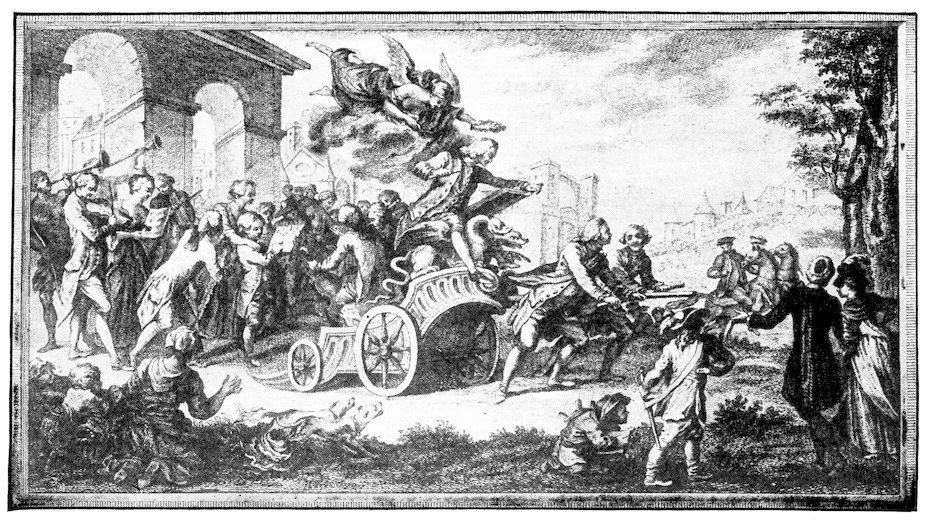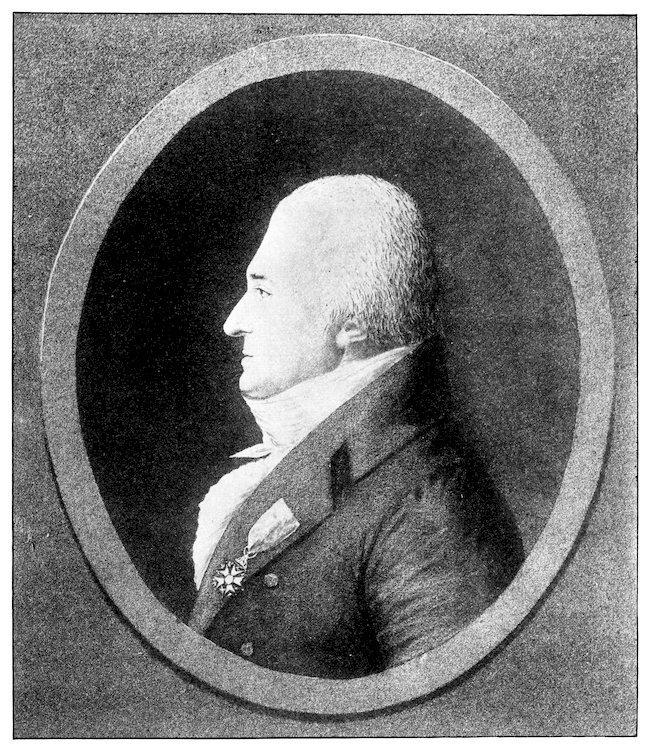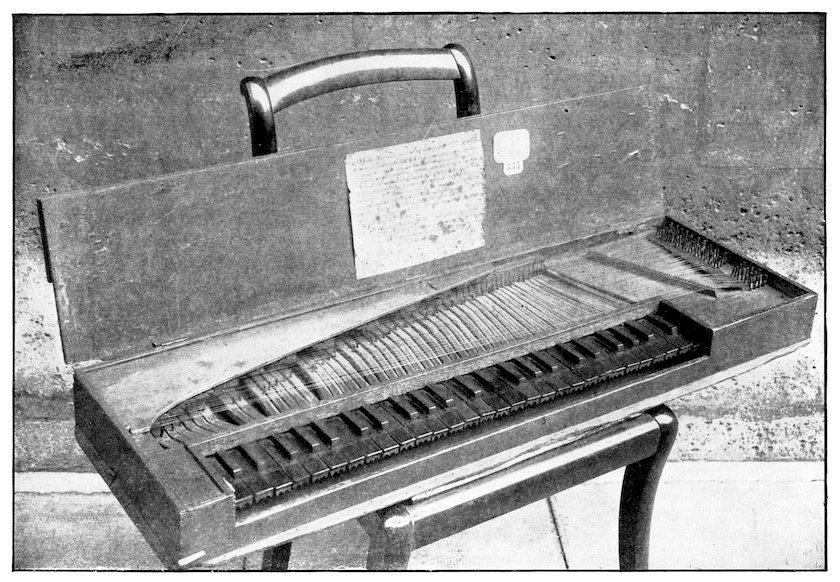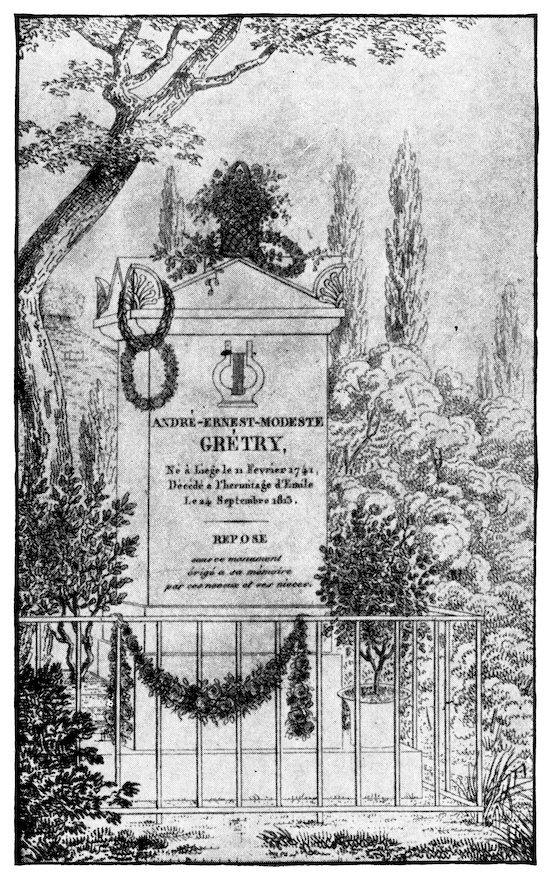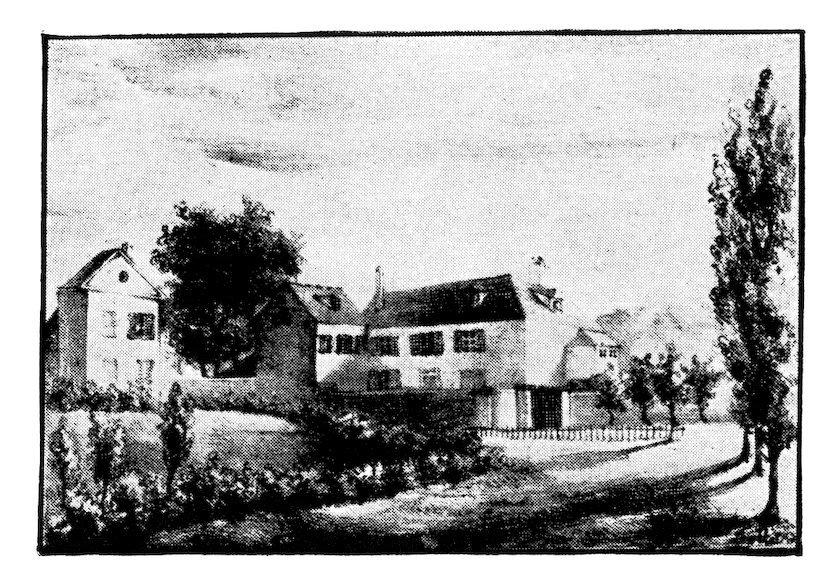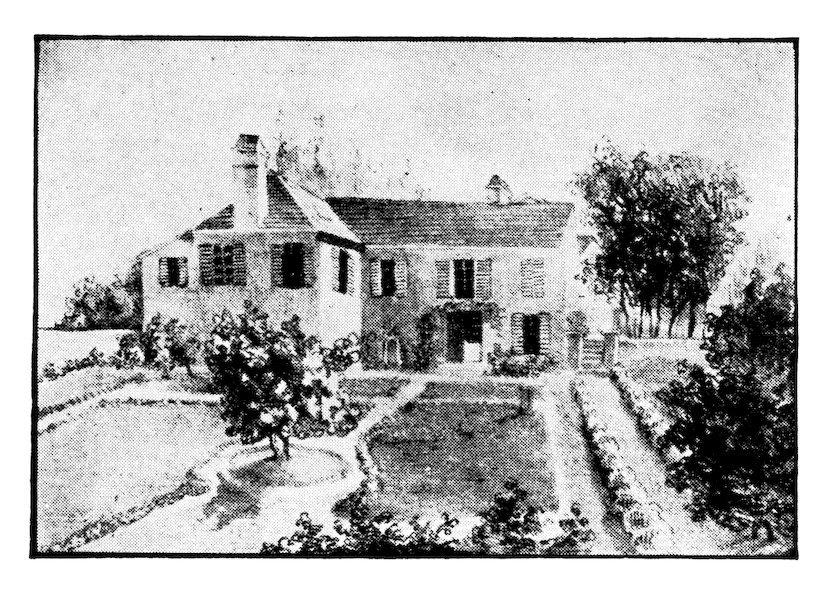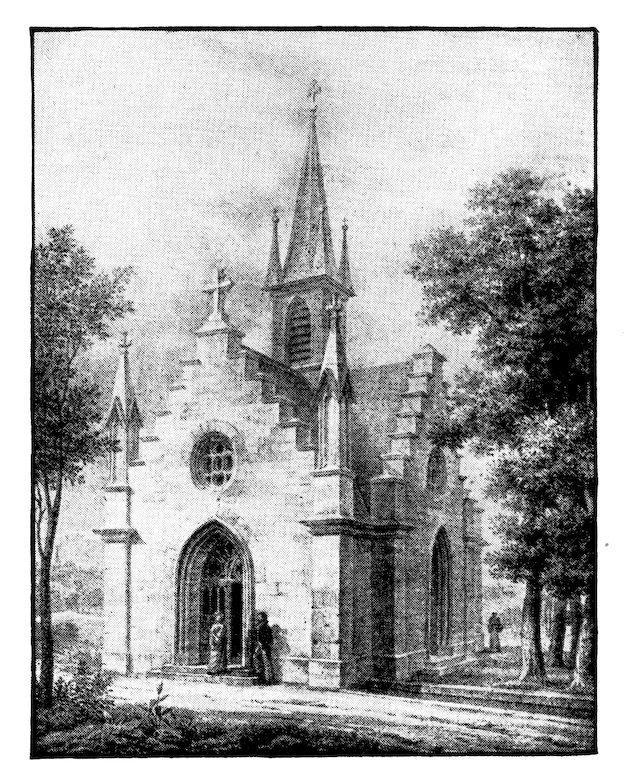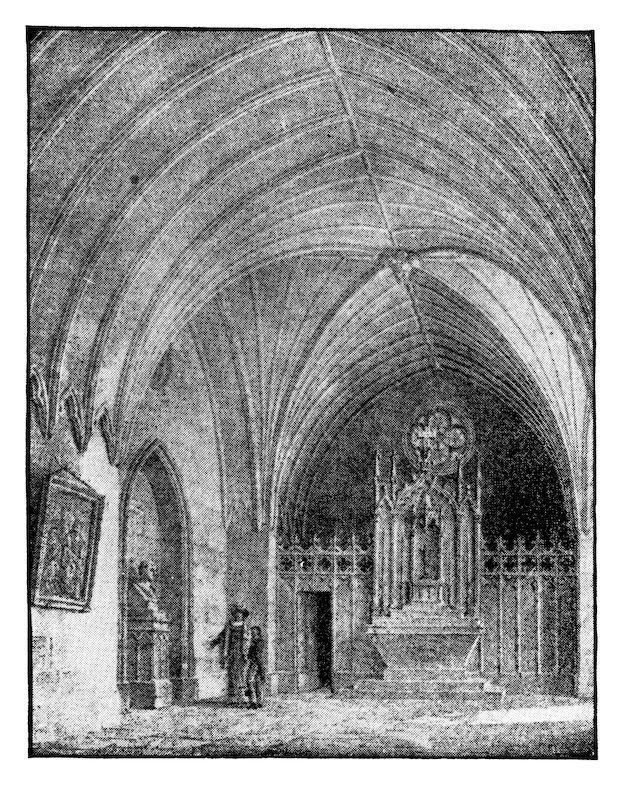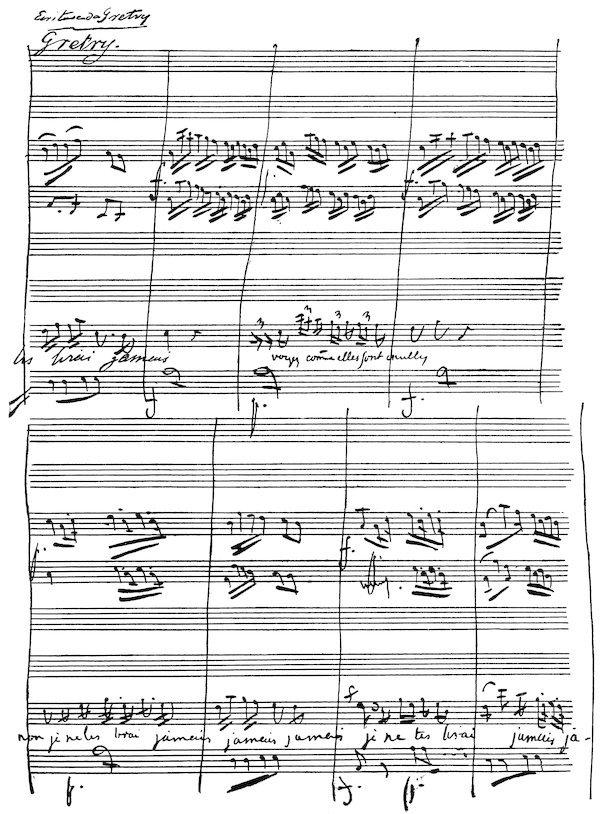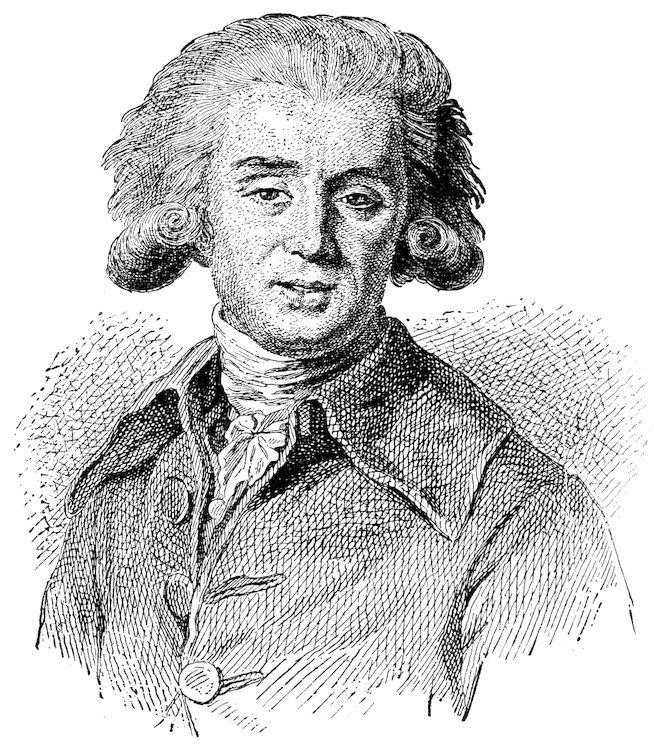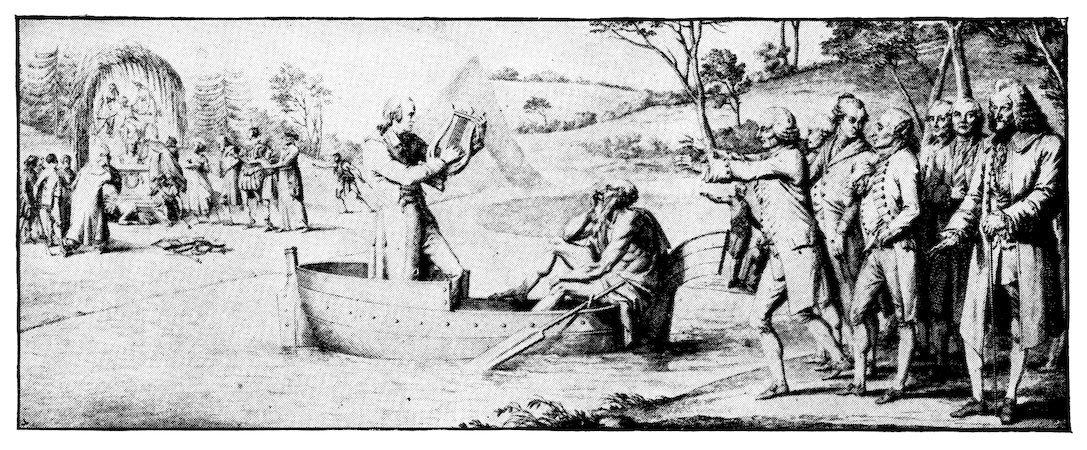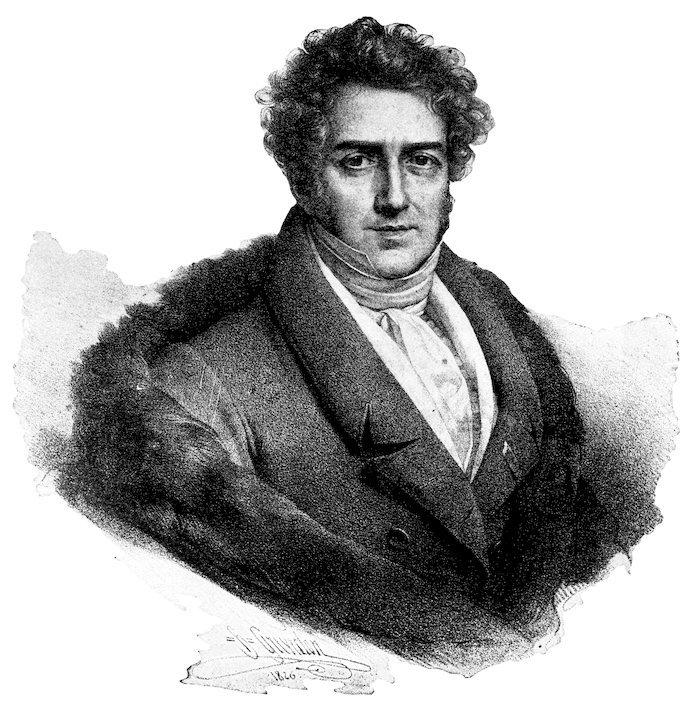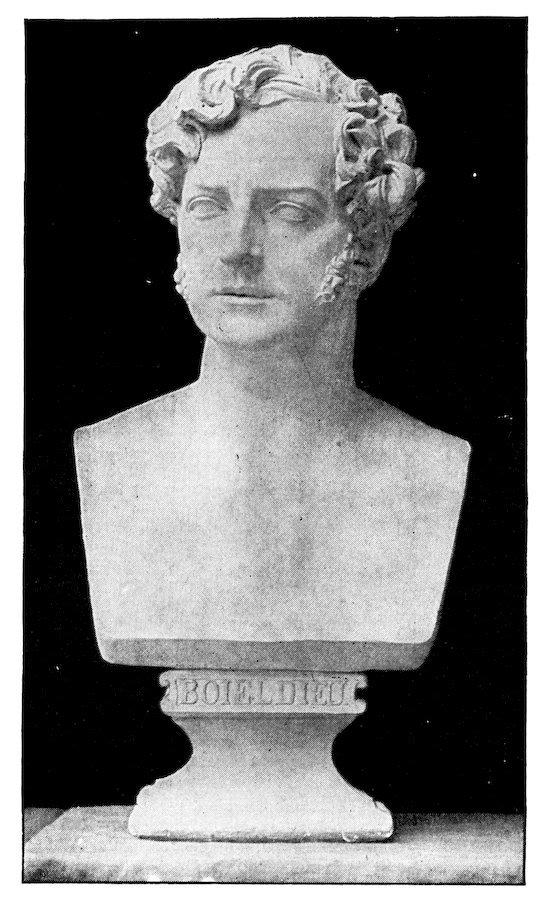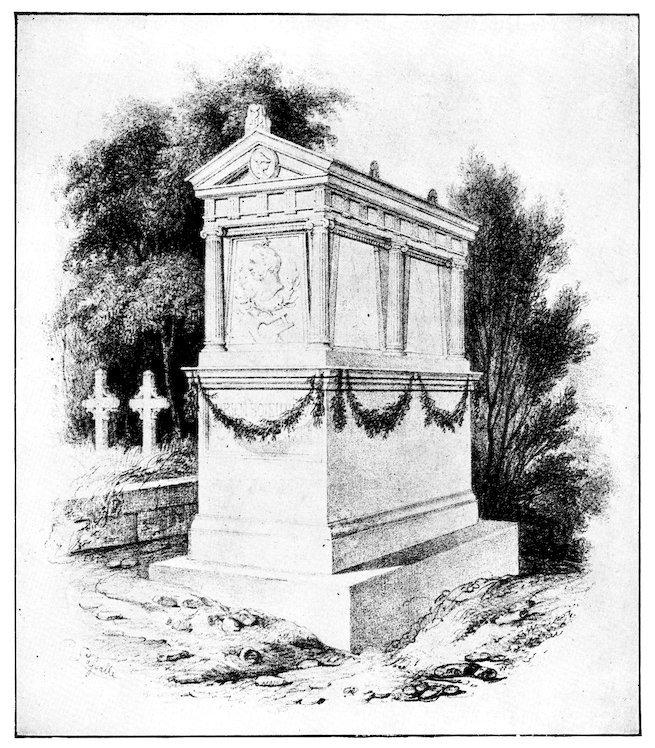Exploring the Variety of Random Documents with Different Content
From a rare engraving by Fessard.
ANDRÉ ERNEST MODESTE GRÉTRY
Reproduction of a portrait by Quenedey painted in 1808.
Grétry at the age of sixty-seven.
TRIUMPH OF RAMEAU.
ANDRÉ ERNEST MODESTE GRÉTRY
André Ernest Modeste Grétry, the author of “Richard Cœur de Lion,” was born at Liège on the 11th of February, 1741. At the age of seven years he was placed by his father, a poor musician and one of the violinists of the Collegiate Church of St. Denis, as a chorister in that church.
The unfortunate little boy, who was of a delicate constitution and who suffered from hemorrhages throughout the whole of his laborious existence, was obliged to walk six times every day from his home to the church—a distance of about a mile—in order to take part in the services. Matins were sung, even in the most rigorous days of winter, between five and six o’clock in the morning. One day the child arrived somewhat late at this early service, and although he was not to blame, the choir-master obliged him to remain upon his knees for two hours in the midst of his fellow choristers. This punishment had such an effect upon little Grétry, who was naturally of a timid disposition, that he would awake several times during the night in a state of fear lest he should arrive too late. “Without considering the hour or the weather, I would often start off as early as three o’clock in the morning, through snow and ice, and would sit down at the door of the church, warming my hands at my little lantern, which I held on my knees. In this way I used to sleep more peacefully, because I was sure that they could not open the door without waking me.”
Grétry finally emancipated himself from this choir, which was a veritable scholastic place of torment, having learned scarcely
anything of music. His first professor of any importance was the organist of the Church of St. Pierre at Liège, M. Renekin, who gave him lessons in counterpoint for two years, and kindly encouraged him in his early essays in instrumental music. The young musician also studied under Moreau, a talented musician and a methodical and conscientious professor.
In order to finish his musical studies and because of an ardent desire to visit other countries, Grétry conceived the idea of going to Rome to establish himself there. The idea of separation was not a pleasant one for his father. He opposed it for two reasons: his son’s delicate health, and the expense which would necessarily be incurred. However, there was no choice but to yield before the determination expressed by this young aspirant to musical glory; and Grétry, who was then eighteen years of age, started from Liège for Rome. He set forth on foot—being destitute of the means which would enable him to make this long journey by coach or on horseback—after having seen performed a mass of his own composition, in recognition of which a present was made him by the canons of St. Denis.
With a small stock of money and a pair of pistols given him by his grandfather to defend himself against the highwaymen—there were highwaymen then, and many of them on the roads of beautiful Italy —Grétry set out with a guide named Remacle, who, in spite of his sixty years, was accustomed to travel on foot from Liège to Rome, and from Rome to Liège, regularly twice a year. His ostensible profession was that of a guide, but he also followed the less respectable and more remunerative calling of smuggler. Remacle fraudulently carried into Rome quantities of fine Flanders lace, while from Rome he brought back relics and Popes’ slippers which he supplied to the convents in the Netherlands. Whether these slippers had really been worn by his Holiness and whether the relics had the origin ascribed to them by the honest Remacle, it is not necessary to inquire here: rumor said so, and by faith we attain salvation.
When the day fixed for the departure of the young musician arrived, the guide went to the house of Grétry’s parents. His coming might be likened to the appearance of a spectre to this poor couple, so deeply affected were they by the departure of their child. Without a word the little fellow laid hold of his valise and strapped it on his
back; then knelt down with his hands clasped before his father and mother and asked their blessing. “God bless thee, dear child!” were the simple words pronounced by the broken-hearted parents, and then the traveller disappeared with his guide.
The son was not less moved than his father and mother, whose kindly faces were bathed in tears and wore the ashy hue of death. “As soon as I was able to think calmly,” writes the musician, “I felt tears trickling down my cheeks, and I said: ‘O God, grant that thy poor creature may one day become the support and consolation of his unfortunate parents!’” How touching is this simple scene, how eloquently does it speak in favor of this patriarchal household which Grétry, by his genius, has made illustrious; and how strongly are our sympathies moved by the immortality earned for it by this most sensible of sons!
The brave youth, who was accompanied by a young surgeon, walked regularly ten leagues a day with his knapsack upon his back. Those were hard day’s marches. At Trèves the two young men began to fear that they would not be able to go any farther, but their energetic determination gave them strength, and they continued their journey, still at the rate of ten leagues a day. They passed through the Tyrol, singing the while, and braved the dangers of the avalanches, and a few days later stood in rapt admiration of the beautiful land of the Milanese. They afterward visited the artistic curiosities of Florence. Every part of Italy was in their eyes an enchanted region. At last Grétry saluted the Eternal City, which he entered by the Porta del Popolo. He had ample time to make himself thoroughly familiar with Rome and to carefully study the works of the Italian masters, then so greatly renowned; for he remained at least nine years in Italy. Here he made his early efforts in sacred and in theatrical music, but without achieving any brilliant success. He was then feeling his way, and did not as yet know for what particular style of music he was best fitted. Chance, however, brought to his notice a comic opera by Monsigny, and he at once felt that his true vocation was the music best suited to comedy. But as Paris was the only field which offered him the means of making himself known to advantage in this branch of musical art, he resolved to settle in the French capital.
In this biography of Grétry it would be unjust to omit the name of the Swedish Envoy, the Comte de Creutz, who raised the musician’s hopes and helped him to continue his struggle at times when he felt greatly depressed. M. de Creutz had divined the degree of genius exhibited in the early attempts of our musician, although they had not been publicly successful, and it is fitting that his name should be mentioned in connection with the successes of his illustrious protégé. Grétry never lost an opportunity of testifying his deep gratitude to M. de Creutz.
When, after his long sojourn in Italy, the composer was guided by his lucky star to settle in Paris, he had neither harpsichord nor pianoforte, and it appears that for some time he pursued his studies without having one of these instruments which are of the first necessity for a composer. It was upon a clavichord lent him by M. Louet that the composer wrote: “Les Mariages Samnites,” “Lucile,” “Le Huron,” “Le Tableau Parlant,” “Le Sphinx,” “Les Deux Avares,” “L’Amitié à l’Epreuve,” and “Zemire et Azor.”
In the clavichord, which was the predecessor of the spinet, brass rods are used instead of pen nibs to make the chords vibrate. Grétry’s clavichord, which may be found in the interesting collection of the Instrumental Museum at the Paris Conservatoire, possesses only four octaves and two notes, as was usually the case with the clavichords of the seventeenth century. We asked permission of M. Pillaut, the learned conservator of the Instrumental Museum, to take a photograph of this clavichord, which is not only highly interesting in itself, but because it was the faithful confidant of the master’s inspiration. M. Pillaut gave the permission asked, and we think it right to tender him our thanks.
GRETRY’S CLAVICHORD AT THE INSTRUMENTAL MUSEUM AT THE PARIS CONSERVATOIRE.
From a photograph made by special permission.
Grétry passed the last years of his life at Montmorency, near Paris, in a house called the Hermitage, where the celebrated writer Jean Jacques Rousseau lived for some time and died. Here, retired from the world, Grétry received his faithful friends of the last days, notably D’Alayrac and Boieldieu, who lived in a cottage near the Hermitage. The old master loved to talk about his art to those who succeeded him in the career, and he lavished upon them the precious counsels of his experience. It was in acknowledgment of this great service that Boieldieu dedicated to Grétry his charming Opera-Comique, “Jean de Paris.” During the latter part of his life Grétry composed nothing, and after the death of his wife, which occurred March 17, 1807, he very rarely visited the theatre. In 1812 Grétry partially rewrote his score of Elisa, which was his last bit of composition. On Sept. 12, 1813, feeling very ill, he wrote the following letter to M. Le Breton, life secretary of the department of Fine Arts at the Institute:—
“My dear colleague: It is impossible for me to be present at the Institute for the judgment of the musical prize. On arriving at the Hermitage, still convalescent, I was attacked with a hemorrhage
which lasted three days, and from which I lost a pint and a half of blood, leaving me extremely weak. I now await the end of my long sufferings. I am resigned, but in leaving this life, I feel that one of my keenest regrets will be never again to meet my dear colleagues whom I love no less than I honor them. I pray you to let them see this letter. Adieu, my dear colleague; I embrace you with all my heart.
G�����.”
A few days later, Sept. 26, 1813, the author of Richard Cœur de Lion passed away. The funeral ceremony took place in Paris, with great solemnity. The pall-bearers were Méhul, Berton, Marsallier and Bouilly.
GRÉTRY’S TOMB AT THE HERMITAGE.
Grétry’s heart has been the object of much discussion, and even a tedious law suit. The composer had often expressed in his lifetime the desire that his heart should be offered to his native city, Liège. M. Flamand, one of Grétry’s nephews, having obtained from the prefect of police at Paris the authorization to have the body exhumed in order to send the heart to Liège, wrote to the mayor of that city and offered him this precious token of the illustrious composer’s ardent love for his native country. The mayor responded in such terms as to cause M. Flamand to reconsider his proposition, and the heart was kept at the Hermitage.
In 1821 the city of Liège reclaimed the bequest which had been made it, but this time M. Flamand absolutely refused to deliver it up. A lawsuit followed which was decided by the court substantially as follows: that since the extraction of Grétry’s heart had been demanded by the family and granted by public authority solely for the purpose of paying homage to the city of Liege, which had prepared a monument to receive it, therefore it should be withdrawn from the garden of the Hermitage, and sent to the commissioners of the city of Liège. This decree was not carried out. The prefect of the Seine and the minister of the interior objected. The question was then carried before the council of state, and in 1828, fifteen years after Grétry’s death, the precious leaden box containing the heart of the illustrious composer was carried to Liège.
Formerly inhabited by Jean Jacques Rousseau.
GRÉTRY’S HERMITAGE.
GRÉTRY’S HERMITAGE.
View from the garden behind house.
MEMORIAL CHAPEL.
Erected by M. and Mme. Flamand Grétry in Enghien, Montmorency, to receive the heart of the illustrious Grétry.
INTERIOR OF CHAPEL.
We cannot close this biography of the most celebrated musician of Liège—one of the most musical cities in Europe—without mentioning the Musée Grétry at the conservatory in the capital of the Walloon country. This most interesting museum, where may be seen the objects which either formerly belonged to the celebrated composer or serve to remind us of him, is the personal work of the present director of the Liège Conservatoire, the learned and distinguished composer, Theodore Radoux. We have had the pleasure of visiting this museum—a veritable shrine—accompanied by M. Radoux, who described the various objects exhibited, in a most lucid and instructive manner.
Grétry left Rome for Geneva in the month of January, 1767. A short time before, Favart’s “Isabelle et Gertrude” had been represented at the Comédie Italienne in Paris. It was a success, but the music seemed to be weak. Grétry seized upon this comedy and wrote new airs for it. “Isabelle et Gertrude” was represented at Geneva, and was very well received.
In Paris Grétry was present at a representation of “Dardanus,” by Rameau, which he did not altogether understand, and which, as he admitted later, he found to be almost wearisome. He was still too full of the memories of Italian music—although it had exercised very little real influence on his genius—to be able to thoroughly appreciate at its proper value this essentially dramatic French music, which was at times somewhat crude as to harmony and melodious expression, but always suited to the action. Nevertheless, although this work of the immediate predecessor of Gluck did not appeal to him strongly, Grétry was not long in recognizing its true merit. He told himself that Music, although not merely the humble handmaid of Poesy, with which she is allied, ought to aid her to express her feelings with due effect, and that consequently theatrical music should, as far as possible, be subject to the rules of pure elocution. Following the example of Lully—for whom Grétry always expressed great admiration—he was wont to attend the Théâtre-Français to find the notes, so to speak, of spoken declamation, and unite it intimately with song and melody. Moreover, the difficulty he experienced in finding a piece to set to music gave him a good deal of leisure; indeed the first two years of Grétry’s stay in Paris were devoted to a search for a poem. At last he obtained from an unknown poet named du Rozoy, “Les Mariages Samnites,” a piece in three acts which was destined for the Comédie Italienne but was not accepted at that theatre and was afterwards rewritten for the Opera. The work was represented there, but with great difficulty and bitter mortification for the composer.
This essay, which failed to impress the public of the Académie de Musique, was followed by “Le Huron,” a comedy in two acts by Marmontel, which was represented for the first time at the Italiens on the 20th of August, 1769. The piece was unanimously and we might say even enthusiastically applauded, both by the audience and by the critics. Above all, the care taken by the composer as to good prosody and the proper feeling peculiar to the dramatis personæ, was greatly applauded. The songs were considered very happy, although they did not exhibit that graceful variety of form and contour then characteristic of the music which the public were accustomed to hear at the Italiens by masters like Piccinni, Pergolèse, Jomelli, Galuppi, etc.
After “Le Huron” was given “Lucile,” also a poem by Marmontel, in which a quartet on the words: “Où peut-on être mieux qu’au sein de sa famille?” was long celebrated. But in reality “Le Tableau Parlant,” the comic opera which followed “Lucile,” consisting of one act in verse by Ansaume, produced at the Italiens, was the starting point of Grétry’s fortune. While fully preserving the good humor of the subject of the piece and the words which are sung during its progress, the composer succeeded in clothing the work of the author of the words with impressive sonorousness, the telling and wellchosen passages being at the same time instinct with frank gaiety.
From that day forth, it may be said that the celebrated composer thoroughly realized his capacity, and it was easy to see that he would take his place in the first rank of comedy in music.
Fac-simile musical manuscript written by Grétry; from Cherubini’s collection.
The name in upper left-hand corner was written by Cherubini.
Grétry did not and could not succeed in grand opera music. Nature had not endowed him with the lofty sentiment of lyric tragedy; he would have needed a courage bordering upon temerity or a highstrung imagination to dare to measure himself with the formidable Gluck, surnamed the Æschylus of music. But if lyric tragedy was a closed book to him, he nevertheless succeeded at the theatre of the Grand Opera in lyric comedy, which he was the first to bring to the notice of the Academy. Grétry himself takes care to tell us this fact in the following passage of his book: “When I introduced lyric comedy on the stage of the opera, I was looked upon as a culpable innovator, and yet I saw that the public was weary of tragedy, which was always on the boards. I heard many lovers of dancing murmur because their favorite art was only allowed to play a subsidiary and frequently a useless rôle in tragedy. I saw the managers who were desirous of adopting the best possible productions, and were feeling their way, unsuccessfully revive fragments or pastorals of former times, and I said as often as I had the opportunity that two styles of music placed in opposition lent each other mutual charms; that the French comedians alternately produced tragedy and comedy, and that if they were obliged to give up these two styles they would not know what to do.” It would appear that the public of the Grand Opera shared Grétry’s opinion, as the composer gave several comedies to that theatre which were brilliantly successful, in particular “La Caravane du Caire,” which had a long and fashionable run. This piece was represented for the first time before the Court at Fontainebleau in October, 1783, and a little later at the Opera. At court, as before the general public, the piece and its music gave the greatest delight to the spectators. The short but brilliant and extremely graceful overture of this work speedily became popular, not only in France but all over Europe. The morceaux of song are gay but elevated and are all agreeable, although the public would have liked them better had they been more strongly tinged with oriental color than they are. If Grétry did not possess the dramatic afflatus in lyric tragedy, he exhibited in all his operas of a semi-character an elevated style which, combined with his exceptional wealth of melody, places him in the first rank of the French masters of the last century. He gave to pathetic scenes a wonderful sublimity, an admirable instance of which may be found in the beautiful prison scene in “Richard Cœur de Lion.” In this work, the fruit of such a rich imagination, Grétry has exhibited the
full measure of his genius and all the talent of which he was possessed as a harmonist. It is interesting to remark in regard to this opera that Grétry made of certain portions of the celebrated ballad, “Une Fievre brûlante,” a sort of leit motiv after the manner of Wagner. Indeed, this fragmentary theme returns again and again under different aspects at least nine times in the course of the score. But we shall see later that Grétry was Wagner’s predecessor not only for the leit motiv, but that he was also the first to suggest an invisible orchestra such as that of the theatre of Bayreuth. As to the characteristic theme of “Richard Cœur de Lion” (the fragmentary ballad considered in its transformations as playing the part of the modern leit motiv), it is curious to notice that Grétry used it in this comic opera with exactly the same idea as Wagner in his lyric dramas. Whenever allusion is made to the royal prisoner, described in the ballad sung by Blondel, a fragment of this air appears. And when Blondel sings to this same air, but in common measure, the following words:
Sa voix a pénétré mon âme, Je la connais, Madame,
“is it not,” writes Grétry, “as though he said: ‘His voice has gone to my heart while he sang the air which he made for you.’”
GRÉTRY
From an engraving after a painting by Mme. Vigée-Lebrun, in 1785, the year of the first representation of “Richard Cœur de Lion.”
“Richard Cœur de Lion”—the denouement of which was changed by the author of the piece, Sedaine, at least three times—marks the culminating point of the master’s career. The piece had a great and lasting success, and it remains still in the répertoire of the Opéra Comique. The instrumentation has been reconstructed in a very careful and happy manner by Adolphe Adam.
After this work Grétry produced several others, which did not, however, meet with the same good fortune. Nevertheless, Grétry occupies a place of honor in the history of theatrical music, and his style is remembered as original. If he never acquired the dexterity of the adepts at counterpoint then in renown, and if his harmonies are at times awkward and even faulty, they still have a peculiar attraction which makes them not only acceptable but original and charming.
One day when I went to see Auber in his little house in the Rue St. Georges I found the author of “La Muette de Portici” and the
“Domino Noir” at the piano with one of Grétry’s scores in front of him. “Just look at this passage,” said Auber, “it is very curious, considered as to the succession of chords. This harmony is certainly not correct, and would never have entered the mind of what is called a musical savant. And yet if you try to change it you may make it more accurate, but it will be wanting in relief and expression.” That is because the awkwardness of Grétry is the awkwardness of an artistic genius, and awkwardness of that kind is a thousand times better than the accuracy of the cold and unimaginative musician.
I said above that Grétry had the first intuition of the leit motiv in “Richard Cœur de Lion,” as a device for recalling to the spectator either an event, a scene, an essential object or a personage, with their distinctive peculiarities, at the same time preserving unity of style in the general construction of his work;—I said that he also imagined an invisible orchestra such as that which exists in the Wagner Theatre at Bayreuth. Grétry speaks as follows in his work, “Mémoires et Essais sur la Musique,” in the chapter entitled: “Plan for a new Theatre”:
“I should like the auditorium of my theatre to be small, holding at the most a thousand persons, and consisting of a sort of open space without boxes, small or great, because these nooks only encourage scandal or worse. I should like the orchestra to be concealed so that neither the musicians nor the lights on their music-stands would be visible to the spectators. The effect would be magical, the more so as it is always understood that the orchestra is not supposed to be there. A solid stone wall ought, in my opinion, to separate the orchestra from the theatre, so that the sound may reverberate in the auditorium.”
GRÉTRY CROSSING THE STYX.
“Grétry in crossing the Styx plays upon his lyre to beguile the time. ‘Why do you not row?’ he asks Charon.... ‘Because I am listening!’”
Drawn by Joly and engraved by Duplessi-Berlaus.
FRANÇOIS ADRIEN BOIELDIEU
Reproduction of a lithograph portrait by Grevedon, 1826, after a painting by Riesener.
FRANÇOIS ADRIEN BOIELDIEU
On December 15, 1775, there was born in Rouen a composer who was to leave an indelible imprint of his abilities upon the operatic music of France. At the beginning of his career there was nothing in his circumstances that could have presaged his future greatness. He was the son of the secretary of Archbishop Larochefoucauld, and his mother kept a small millinery store in the old-fashioned city. His parents did not enjoy perfect conjugal felicity, and finally their quarrels led to a divorce, soon after which the father married again. The young Boieldieu was designed for a musical career, and his father soon sent him to the cathedral as a choir-boy. In those days music was frequently made a matter of apprenticeship, and was studied almost as if it had been a handicraft; it is therefore not surprising to find the lad indentured to the cathedral organist Broche, who led him a sorry life. Those who are familiar with the early life of Haydn will recall how that composer was forced for a time to be merely the lackey of Porpora; Boieldieu was in still worse case, for his master was both a drunkard and a martinet, and many a corporal punishment was inflicted on the apprentice merely because of errors in musical exercises. It seems strange that the rough induction into the art did not cause the lad to hate music and finally desert it, but, as was the case with Beethoven, the tears of childhood only seem to have cemented the foundation of his education. Broche made the curriculum hard and dry enough, and the companions of
the lad (“le petit Boiel” they called him then) added to his discomforts by laughing at his shyness and awkward ways.
Naturally enough Boieldieu stood in mortal terror of his brutal taskmaster, and the culmination of his fright came one day when he accidentally upset an ink bottle on one of Broche’s books; expecting nothing less than capital punishment for such a heinous crime, the boy took to his heels, and, at the age of twelve, ran away to Paris. How he managed to get there without money or assistance is not clearly known, but he eventually arrived and sought out some relatives who dwelt in the French metropolis. These gave him shelter, but at the same time notified his parents, who soon took him back to his musical and menial drudgery. Nevertheless his condition seems to have been bettered by his escapade, for Broche was warned to use milder measures with him, and he remained at his studies with the organist until he was sixteen. During these four years his taste for operatic music began to awaken, and he was a constant attendant at the performances in the provincial theatre. As he had no money he was obliged to resort to all kinds of expedients to obtain admission, and there are many anecdotes extant of his ingenious efforts to hear this or that opera without going through the slight preliminary of paying for his admission. At times he would slip into the theatre early in the morning, carrying a bundle of music, as if he had been sent as messenger to some of the orchestra, and then, by hiding through the day, often without food, he managed to stand through the performance in the evening, after which he would hurry home well contented with his good fortune. The operas which he heard at this period of his career were chiefly those of Grétry or of Mehul, as both composers were much in vogue at that time, and he was much influenced by their light and melodious style. It was not long before his ambition was awakened to an attempt to imitate them and to compose an opera himself. He was eighteen years old when he accomplished this task. He had sought in vain for a libretto, and finally had recourse to his father, who gave him the text for an opera which enjoyed an evanescent success. “La Fille Coupable” was the name of this Opus 1, which was completed in 1793 and has now disappeared. One can imagine that the audiences were neither overrefined or hypercritical in those days of the Reign of Terror, but a more cultivated era soon followed, and the second opera, which came two years later, and was entitled “Rosalie et Myrza,” was less
favorably received. Boieldieu was not yet ripe for operatic composition, but at least these works furthered his career in that they obtained him the privilege of free entrance to other operatic performances, and thus his experience and taste were gradually expanded.
BUST OF BOIELDIEU BY DANTAN.
From the Carnavalet Museum, Paris.
The partial success fired his heart sufficiently for him to leave Rouen and seek Paris for the second time. This time he carried with him thirty francs, an operatic score, and an abundance of selfconfidence. He was now nineteen years old. His reception was the chilling one usually accorded to young composers in Paris, and very
soon he began to feel the nippings of hunger, which put the thoughts of public success out of his head for the nonce, and drove him to teaching piano. He however had the good fortune to make the acquaintance of the celebrated tenor Garat, and this gentleman became interested in him, and finally sang some of his chansons in public and in fashionable drawing-rooms. These little songs soon found favor, and Boieldieu became gradually known through them. M. Cochet, the publisher, paid him twelve francs each for these productions, a figure which seems ridiculous until one remembers that Schubert sometimes accepted a franc or two for some of his immortal lieder. Some of these early works of Boieldieu are still in the musical repertoire, and are occasionally heard in concerts, as for example, “O toi que j’aime,” and “Menestrel,” and they served at the time to spread the social success of the composer. Finally Boieldieu made the acquaintance of Fiévée, the novelist, who wrote for him a short libretto in one act, “La Dot de Suzette,” and this opera, after many intrigues and jealousies, achieved performance and success, thanks to a bright libretto, sparkling melodies, and the excellent performance of Madame St. Aubin.
Boieldieu’s prospects now changed with Aladdin-like suddenness, for his next opera, “La Famille Suisse,” was performed at the Theatre Feydeau for thirty nights in alternation with Cherubini’s “Medee,” and thus early began that connection with the great Italian maestro, at that time the best musician in France, which was to be so fruitful of good results to the new favorite. In 1798 Boieldieu turned for a while from operatic work, and composed a number of piano sonatas, piano and harp duets, and a piano concerto. Although these exercised no permanent influence on the art, they obtained for him the appointment of professor of piano at the Paris Conservatoire, two years later. In this position, however he was not very successful; he was too much wrapped up in composition to make a good teacher. The musical historian Fétis, who was his pupil, confirms this estimate; but the post at the Conservatoire led to a close acquaintance with Cherubini, by which Boieldieu began to remedy his lack of knowledge of counterpoint and fugal work. Although Fétis denies that Boieldieu was ever the pupil of Cherubini, there is every reason to believe that this was the case, even if a regular stipend was not paid for the tuition. The very fact that in 1799 the two worked in collaboration on “La Prisonnière” might tend to show that Boieldieu
was anxious to attain something of Cherubini’s musical learning, and his submission of many later operas to the judgment of this master proves that he was willing to be guided by him.
About this time Boieldieu produced two operas that carried his fame beyond his native country; these were the Polish “Benjowski” and the very tuneful “Caliph of Bagdad,” both of which will receive further mention in the analytical portion of this article. A little later there appeared a more advanced work,—“Ma Tante Aurore.” The success was now so well established that all Parisian managers sought for works from the gifted pen, and opera followed opera.
TOMB OF BOIELDIEU IN PÈRE LACHAISE, PARIS.
From a lithograph.
Boieldieu now lived on contentedly in Paris until 1802, when he almost wrecked his career in the same manner that his father had done; on March 19th of that year he married a ballet-dancer named Clotilde Mafleuroy, and immediately began to taste the bitterness of conjugal misery. He suddenly left Paris on this account and sought employment in Russia. He was received in St. Petersburg with open
arms, and the Czar Alexander at once appointed him capellmeister of the court. He produced little on this barren soil however, and although he stayed there eight years, and his contract called for three new operas and a number of military marches annually, scarcely anything of this period has been preserved. In 1810 the political horizon began to darken, and trouble between Russia and France became so imminent that our composer again suddenly packed up and returned to his beloved Paris, arriving at the beginning of 1811. Here however he found everything changed. The Napoleonic wars had exerted a deleterious influence on operatic patronage, and the taste, too, had changed in some degree; Cherubini and Mehul were silent, and Isouard alone ruled Opera Comique. Considerable jealousy of Boieldieu was at this time displayed, and at first he was unsuccessful in having any of the works he had written in Russia performed in Paris; therefore he set himself to producing an original work, and in 1812, “Jean de Paris,” a masterpiece of its kind, was produced at the Theatre Feydeau. Again a success was won, although not such a phenomenal one as the “Caliph of Bagdad” had attained, and for the next six years another series of operas proved that the composer had not lost his hold upon the Parisian public, and in addition to his own operas Boieldieu collaborated with Cherubini and Isouard. Two years later a great success attended the first production of “Le Chaperon Rouge,” but the composer was so exhausted by this effort that he was obliged to rest for a while from further composition. He now received the position of professor of composition at the Conservatoire, taking the place of Mehul, and for seven years he produced nothing more in opera. The crowning work was however to come later. During a stay at his brother’s farm in Cormeilles Boieldieu began composing once more. This time it was something far beyond his previous efforts, it was a chef d’œuvre in the domain of comic opera,—the ever-beautiful “La Dame Blanche.” This masterwork was performed in December, 1825, and at once awakened boundless enthusiasm. Boieldieu was not much exhilarated by the result, for he seemed to feel that he could never hope to equal this work again. Nevertheless he soon attempted another subject, as if to ascertain if his surmises were correct. Bouilly’s dull libretto, “Les Deux Nuits” was accepted, as much from friendship as from any other motive. The new opera was finished in 1829, and made a flat failure, a result which hurt Boieldieu’s feelings
in an inordinate degree. He had brought back a pulmonary trouble from Russia, and his disappointment seemed to aggravate the disease. He gave up his position at the Conservatoire, feeling too weak to continue teaching. The director of the Opera Comique had given Boieldieu a pension of 1200 francs for his great services to the art, but the expulsion of Charles X. now came about, a new direction was installed, the institution was found to be bankrupt, and the income from this source ceased just when it was most needed. He had married again in 1827, and this time the union was a fortunate one, for in these final days of trial, sickness, and pecuniary difficulty, his wife sustained his drooping spirits with unswerving fidelity. She was a singer, Philis by name, and was the mother of Boieldieu’s only son, a composer of good attainments, but overshadowed by his father’s ability. Finally Louis Philippe was established on the throne of France, and his minister, M. Thiers, made speedy recognition of the value of Boieldieu’s work by granting him an annual pension of 6,000 francs. It could not give back the composer’s health, however, and, after a tour to Pisa he came back worse. He had been obliged by poverty to take back his old position at the Conservatoire, and made a brave effort to continue in it, but it was useless; in another tour in hopeless search for health, he died at Jarcy, October 8th, 1834. At the tomb his old companion and teacher, Cherubini, gave a last tribute to the modest and talented nature that had passed away so prematurely.
Boieldieu may be summed up in a single phrase as a Parisian Mozart. He had Mozart’s gift of melody and grace, and in his later years something of Mozart’s skill in harmonic and contrapuntal combination, but, unlike Mozart, his work can be divided into three epochs, the third only being comparable in ensemble to the works of the German master. Boieldieu has been ranked as the best composer of opera comique that France ever produced, and it is not too much to say that only Bizet has approached him in characteristic touches and poetic inspiration. Three works are at present the chief representatives of Boieldieu’s fame, “The Caliph of Bagdad,” which shows his earliest method, “Jean de Paris,” which is a good example of his second period, and “La Dame Blanche,” which is the finest of all his operas, the best outcome of the French opera comique school, and shows the composer in his third and best period of growth.
Boieldieu was never misled by the popular applause which was showered upon him before it was fairly deserved. It has been well said that “there is no heavier burden than a great name acquired too soon,” and it is to the credit of Boieldieu that, although he acquired this burden with “The Caliph of Bagdad,” which has had over a thousand performances in France, he did not continue in the rather frivolous vein which had so captivated his earliest audiences. His modest desire to advance may be proven by the fact that when this opera was achieving its greatest success, Cherubini reproached him with “Malheureux! are you not ashamed of such an undeserved success?” when Boieldieu mildly begged for further instruction, that he might do better in the future. He even courted the opinions of his pupils in the Conservatoire as to portions of his work, a rather dangerous meekness. Pretty tunes and marked rhythms are the characteristics of this period. “Zoraime et Zulnare,” although at present almost unknown, always remained a favorite of the composer, but it is only another example of musicians not being the best judges of their own works.













